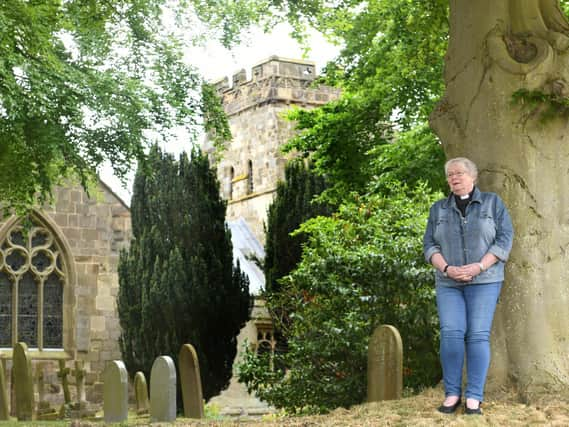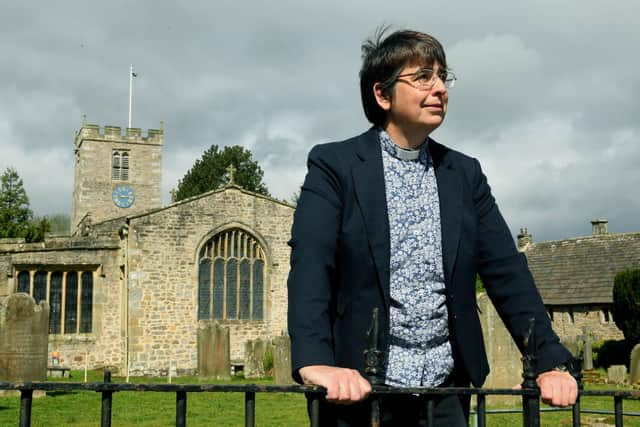How lockdown changed life for reverends in the Yorkshire Dales and the Wolds


Since lockdown began, Sundays have become very different.
Now, at 10am, like those in her congregations, she lights a candle and prays.
Worshippers do the same, reading from an order of service, complete with prayers, a sermon and notices, that arrived in their email inboxes the night before.
Advertisement
Hide AdAdvertisement
Hide Ad

“The church has endlessly reinvented itself over history,” Rev Hewlett said. “Here, we have a very scattered population where church is very important to people.
“We are still doing the worship together as far as we can.”
Due to a lack of reliable broadband, streaming or filming services “just wouldn’t be acceptable”, and the act of worshipping together at the same time, but in their own homes, keeps the communal act of church going.
Like in many other rural parishes, lockdown has presented challenges - not least maintaining pastoral support for her congregation. She spends most days on the phone, checking in on people, or helping the swathes of volunteers supporting those who can’t get out.
In Reeth, where she is based, groups that mobilised during the devastating floods of last July when 100 houses and 40 farms were hit, are once again supporting their communities, but the financial strain of having church doors’ closed is hitting.
Advertisement
Hide AdAdvertisement
Hide AdMajor fundraising events have been cancelled, such as the annual car boot sale at the 900-year-old ‘Cathedral of the Dales’, St Andrews in Grinton, which would have brought in around £1,800 on Bank Holiday Monday, and the annual duck race at St Marys in Arkengarthdale.
Each week, money would have come in via a bake sale at a village market, and collection plates are empty when no services are running. But mainly, it is the missing tourism pound that will be impacting the most - and will continue to do so once they reopen, Rev Hewlett said.
She said: “Out here in the countryside, our churches are usually open all day every day, and obviously we won’t be able to do that, have people coming in and out. That will affect our income, as a lot of it is tourist trade, people who come in and pray, but they buy a postcard or they put a couple of quid in a box.”
Another challenge will be dealing with the emotional impact of the pandemic.
Advertisement
Hide AdAdvertisement
Hide Ad“Most people are fine,” Rev Hewlett said. “Because of where we live, people are used to being far away, sorting out shopping, that sort of thing, but we are still recovering from floods last year.
“There’s quite a lot of anxiety around. It’s a small community, with a lot of older people, and once lockdown happened, nothing moved. Now that it has eased up, there’s people coming in from the outside and there is fear that they will come from the towns and bring the virus with them.”
Reopening will bring further challenges, with cleaning and sanitising historic buildings and ensuring social distancing is maintained while the fellowship element of the church remains.
Rev Hewlett added: “We want to do it right, but we also want to spread the message that the church hasn’t stopped. We are still alive and kicking and here in a different shape.”
Advertisement
Hide AdAdvertisement
Hide AdThat is very much the message across in the Yorkshire Wolds, where Rev Jackin Tonkin is priest in charge of the Waggoners Benefice - six rural churches in Wetwang, Sledmere, Fimber, Fridaythorpe, Cowlam and Thixendale.
As Area Dean of Harthill, she has a broader knowledge of 27 parishes too, but one thing is paramount for her: “Our buildings may be shut but the church itself is very much open.
“It’s a mixed picture but we are all facing the same challenges.”
The main, she said, is financial. While it will be some time before the full picture is known, the rental income from the groups that hire church halls has been a big loss, as has that which comes in when weddings and baptisms are held. But she remains positive.
Advertisement
Hide AdAdvertisement
Hide Ad“We have had to cancel or postpone a number of weddings and baptisms and we are just hopeful that we can rearrange - this of course has a financial impact but we are also dealing with a lot of disappointed people,” Rev Tonkin said.
“Hopefully they will both just be short-term issues - people will still want to get married, and the babies will just be a little larger when they are baptised. Financially, it’s a delay not a loss.”
There, services have been streamed on Zoom or recorded, but she is very conscious that not everybody in her parishes will have access, so “a lot of phone calls have been made, and a lot of old-fashioned letters written”.
Family members living far from parishioners have also turned to clergy to check their loved ones are OK.
Advertisement
Hide AdAdvertisement
Hide Ad“People need a bit of reassurance,” Rev Tonkin said. “But the obvious thing for me is that the prayer, the care and the love has been evident.
“Going forward, there are going to have to be changes made. We have a number of people for whom church is no longer accessible, and it has become so. We need to maintain our streamed services for them. We must not forget them when we physically open our doors again.
“This has been an opportunity for the church to extend its reach rather than shrink it, and I’m looking forward to continuing this momentum when lockdown lifts.”